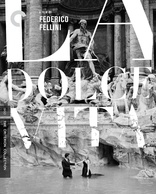La Dolce Vita Blu-ray Movie
HomeLa Dolce Vita Blu-ray Movie 
Criterion | 1960 | 176 min | Not rated | Oct 21, 2014Movie rating
8.2 | / 10 |
Blu-ray rating
| Users | 4.0 | |
| Reviewer | 5.0 | |
| Overall | 4.3 |
Overview
La Dolce Vita (1960)
Marcello is a third-rate reporter who lives a playboy's life as he pursues a shabby career of scandal mongering. His increasingly amoral interest in the "sweet life" of high society takes him to hedonistic parties and orgies throughout modern day Rome, as days and nights blur into one another.
Starring: Marcello Mastroianni, Anita Ekberg, Anouk Aimée, Yvonne Furneaux, Magali NoëlDirector: Federico Fellini
| Drama | Uncertain |
| Foreign | Uncertain |
Specifications
Video
Video codec: MPEG-4 AVC
Video resolution: 1080p
Aspect ratio: 2.35:1
Original aspect ratio: 2.35:1
Audio
Italian: LPCM Mono (48kHz, 24-bit)
Subtitles
English
Discs
50GB Blu-ray Disc
Single disc (1 BD)
Playback
Region A (locked)
Review
Rating summary
| Movie | 5.0 | |
| Video | 5.0 | |
| Audio | 5.0 | |
| Extras | 4.5 | |
| Overall | 5.0 |
La Dolce Vita Blu-ray Movie Review
Reviewed by Dr. Svet Atanasov October 14, 2014Winner of the prestigious Palme d'Or Award at the Cannes Film Festival and Oscar Award for Best Costume Design, Federico Fellini's "La Dolce Vita" (1960) arrives on Blu-ray courtesy of Criterion. The supplemental features on the disc include new visual essay by filmmaker ::kogonada; exclusivenew video interview with director Lina Wertmuller; new video interview with Italian journalist Antonello Sarno; new video interview with film scholar David Forgacs; archival interviews with Federico Fellini and Marcello Mastroianni; and more. The release also arrives with an illustrated leaflet featuring Gary Giddins' essay "Tuxedos at Dawn". In Italian, with optional English subtitles for the main feature. Region-A "locked".
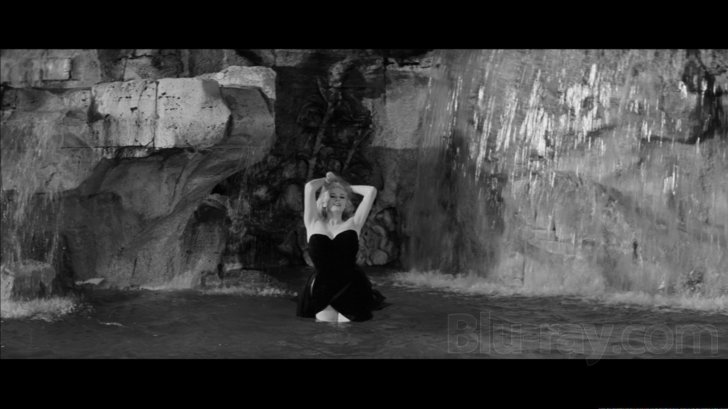
Marcello, come here.
The film is set in the Eternal City and chronicles a series of seemingly random events as seen and experienced by a successful but jaded reporter named Marcello (the great Marcello Mastroianni, 8½, Divorce Italian Style). It begins and ends abruptly, like a documentary feature.
The camera follows Marcello as he moves from one location to another and talks to aging movie stars, wealthy businessmen, playboys, dignitaries and their lackeys. These are his people -- the men and women with the juicy stories the masses want to read about. They know Marcello and he knows them. Some are cautious when they talk to him, but others are careless and eager to impress him.
Like his colorful friends, Marcello has learned to wear different masks and utter half-truths. He tells his suicidal fiancee (Yvonne Furneaux, Le Amiche, Repulsion) that he cares for her, but secretly sees a wealthy socialite (Anouk Aimee, Lola, A Man and a Woman) who wants to marry him. When his father visits him he tells him that he has settled down, but deep inside he still feels like a tree without roots.
The arrival of a sexy movie star (Anita Ekberg, Boccaccio '70, Killer Nun) has a profound impact on the way Marcello sees the world he lives in. Initially her beauty overwhelms him and driven by sexual desire he does his best to seduce her, but when she rejects his advances he suddenly realizes how shallow and empty she is. Then gradually he begins to question his admiration for the sweet life.
Federico Fellini’s La Dolce Vita is about a country in transition and its people trying to fit in a strangely chaotic reality. It takes place over the course of only a few days and nights, but it manages to capture the spirit of a transformation that lasted more than a decade.
The film is built upon a series of symbolic sequences which carefully satirize traditional Italian values and beliefs. Additionally, the upper class, the media, and even the Catholic Church all become targets whose roles and credibility are essentially reevaluated as Mastroianni’s journalist wanders the Eternal City’s busiest streets, visits the most popular restaurants and clubs and mingles with their guests.
At times it may seem like there is too much noise and chatter that amount to nothing, but the attitudes behind them are very important. They reveal a massive class division, point to the acceptance of new media standards (see the easiness with which the paparazzi behavior is tolerated), and even the erosion of the traditional trust between the two sexes (see Marcello’s polarizing relationships with the promiscuous socialite and his fiancee).
The film’s framing is as unique as the structure of its narrative. For example, space and character/object placement constantly evolve, making various sequences look either under or overpopulated. There are a number of atypical tracking and traveling shots as well.
Fellini shot La Dolce Vita with cinematographer Otello Martelli (La Strada, Il Bidone) on location in Rome and Cinecitta Studios. It was a long, very expensive and closely monitored and covered by the Italian media production.
The soundtrack for the film was created by legendary composer Nino Rota (The Godfather, Rocco And His Brothers).
La Dolce Vita Blu-ray Movie, Video Quality 
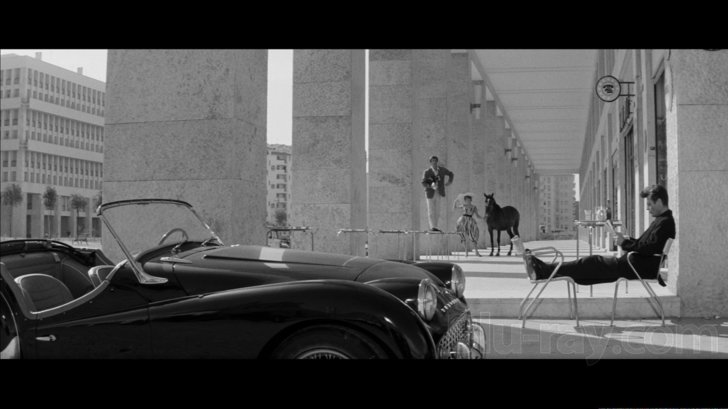
Presented in its original aspect ratio of 2.35:1, encoded with MPEG-4 AVC and granted a 1080p transfer, Federico Fellini's La Dolce Vita arrives on Blu-ray courtesy of Criterion.
The following text appears inside the leaflet provided with this Blu-ray release:
"This new digital transfer was created in 4K resolution on an ARRISCAN film scanner from the original 35mm negative and a 35mm fine-grain positive, with the help of Ennio Guarnieri, camera assistant to cinematographer Otello Martelli. The original monaural soundtrack was remastered at 24-bit from the 35mm optical soundtrack positive. The film was restored by Cineteca di Bologna - Laboratorio L'Immagine Ritrovata in 2010, in association with The Film Foundation, Pathe, Fondation Jerome Seydoux-Pathe, Mediaset-Medusa, Paramount Pictures, Cinecitta Luce, and Centro Sperimentale di Cinematografia - Cineteca Nazionale. Restoration funding was provided by Gucci and The Film Foundation."
I first saw the 4K restoration of this legendary film last year when French label Pathe introduced it in France and was very pleased with it (the release isn't English-friendly). Predictably, Criterion's presentation, which uses as a foundation the same 4K restoration, is just as impressive. Indeed, the improvements in detail and clarity are very easy to see throughout the entire film. Well-lit close-ups, in particular, look spectacular, and often reveal tiny details that are not visible on the old R1 DVD release. The wider panoramic shots boast impressive fluidity (see screencaptures #5 and 13). Viewers with large screens and projectors will also notice substantial improvements in the area of color balance and stability. On the new presentation during daylight and nighttime footage the blacks, whites and the variety of grays are very impressively balanced, and with the added benefits of the improved definition and clarity the final result is indeed quite remarkable (see screencapture #16). Though occasionally there are traces of some extremely light noise corrections, grain is retained. Also, there are some minor density fluctuations which also affect grain distribution, but they occur in areas of the film where it is easy to see that time has left its mark. Still, from start to finish the film does have a solid organic appearance and looks quite wonderful. Large damage marks, debris, cuts, stains, and warps have been removed as best as possible. A few minor age-related imperfections remain -- for example, a few highlights pop up in the right corner of the frame around the 01.41.28 mark, where Marcello, his father and one of his coworkers are seen in the Cha-Cha night club -- but they never become distracting. Lastly, there are no stability or transition issues to report in this review. All in all, this is a wonderful presentation of the 4K restoration of La Dolce Vita which more than likely will remain the film's definitive presentation on the home video market. (Note: This is a Region-A "locked" Blu-ray release. Therefore, you must have a native Region-A or Region-Free player in order to access its content).
La Dolce Vita Blu-ray Movie, Audio Quality 
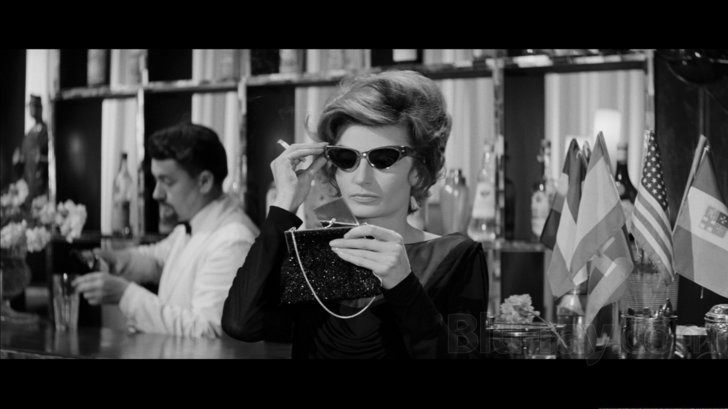
There is only one standard audio track on this Blu-ray release: Italian LPCM 1.0 (with some very small portions of English). For the record, Criterion have provided optional English subtitles for the main feature. When turned on, they appear inside the image frame and only for the Italian dialog.
Depth and clarity are very good. Also, it is easy to tell that different balance and stabilization enactments have been performed as the 'thinning' in the high-frequencies present on the R1 DVD release has been effectively eliminated. Overall dynamic intensity is rather limited, but Nino Rota's score easily breathes throughout the film. The dialog is clean, stable, and easy to follow. There are no pops, crackle, background hiss, audio dropouts, or digital distortions to report in this review.
La Dolce Vita Blu-ray Movie, Special Features and Extras 
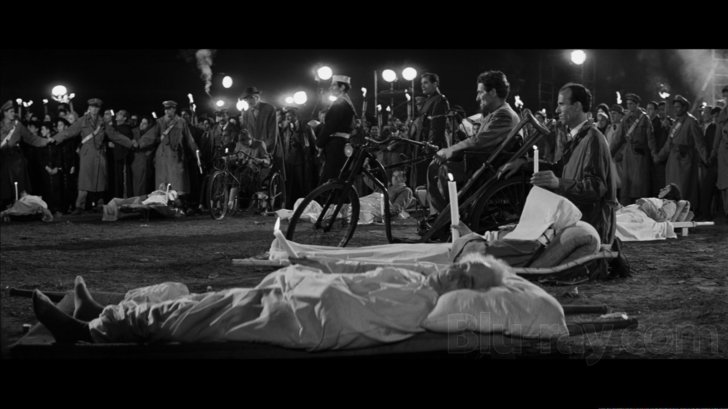
- The Eye & The Beholder - presented here is a new visual essay which focuses on the framing and camera movement in La Dolce Vita and offers visual comparisons between different sequences from it and similarly framed sequences from other classic films (Francois Truffaut's The 400 Blows, Jean-Luc Godard's Breathless). The essay was created by filmmaker ::kogonada for Criterion in 2014. In English, not subtitled. (10 min, 1080p).
- Federico Fellini - in this 1965 interview, conducted by Irving R. Levine for NBC News, Federico Fellini explains what inspired him to become a director, and discusses his experience as a journalist, his unwillingness to discuss the messages of his films, the enormous impact Charlie Chaplin and Roberto Rossellini's work had on him, etc. In Italian and English, with optional English subtitles where necessary. (31 min, 1080p).
- David Forgacs - in this new video interview, film scholar David Forgacs discusses the socio-political climate in Italy at the time when La Dolce Vita was shot, its unique themes and narrative structure. The interview was conducted exclusively for Criterion in June 2014. In English, not subtitled. (15 min, 1080p).
- Lina Wertmuller - in this new video interview, Lina Wertmuller (All Screwed Up, Swept Away), who began her career as an assistant director on Federico Fellini's 8½, talks about the great Italian director's legendary sense of humor and his relationship with actress Giulietta Masina (La Strada) and special bond with Marcello Mastroianni, and discusses Anita Ekberg's image at the time when La Dolce Vita was shot as well as the film's final sequence. In Italian, with optional English subtitles. (8 min, 1080p).
- Antonello Sarno - in this new video interview, Italian journalist Antonello Sarno discusses the unique atmosphere in the Eternal City during the late '50s and early '60s, Federico Fellini's relationships with producers Dino De Laurentiis and Angelo Rizzoli, production designer Piero Gherardi's invaluable contribution to La Dolce Vita, and the dolce vita fashion trends the film inspired. The interview was conducted exclusively for Criterion in June 2014. In Italian, with optional English subtitles. (16 min, 1080i).
- Marcello Mastroianni - presented here is an archival audio interview, the legendary Italian actor recalls his initial encounter with Federico Fellini, and discusses the different characters he played in his films as well as the unique relationship between fantasy in reality in his body of work, his fascination with science fiction, the invaluable advices the Italian director always had for him, etc. The interview was conducted by film historian Gideon Bachmann in 1963. In Italian, with optional English subtitles. (48 min, 1080p).
- Felliniana - presented here is a selection of La Dolce Vita ephemera -- including posters, lobby cards, and press books -- taken from Don Young's massive collection of Federico Fellini-related memorabilia, the Felliniana Archive. (1080p).
- Leaflet - illustrated leaflet featuring Gary Giddins' essay "Tuxedos at Dawn" and technical credits.
La Dolce Vita Blu-ray Movie, Overall Score and Recommendation 
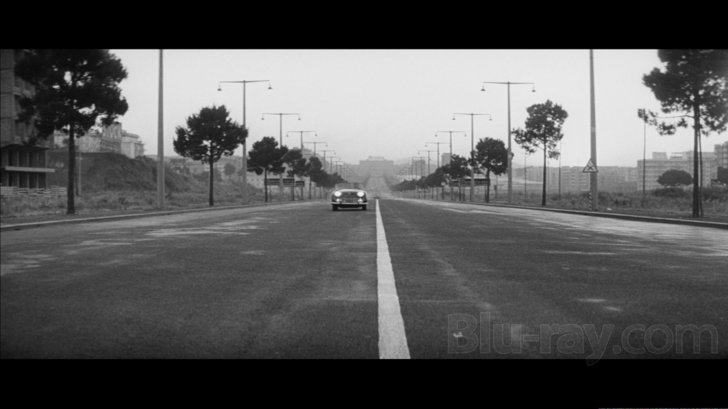
Federico Fellini's La Dolce Vita is unquestionably one of Italian cinema greatest masterpieces. Though it focuses on a very specific transitional period, its dissection of Italian culture and post-war class system remains relevant today. (For an updated examination of Italy's socio-economic and political milieu inspired by Fellini's film, see Paolo Sorrentino's Oscar winner The Great Beauty). Restored in 4K, La Dolce Vita now looks beautiful on Blu-ray. Criterion's upcoming release has a number of new supplemental features, including a short but excellent exclusive new video interview with Italian director Lina Wertmuller. VERY HIGHLY RECOMMENDED.
Similar titles
Similar titles you might also like

I Vitelloni
1953

The White Sheik
Lo sceicco bianco
1952

La Strada
1954

Nights of Cabiria
Le notti di Cabiria
1957

And the Ship Sails On
E la nave va
1983

Il Bidone
The Swindle
1955

8½
Otto e mezzo / Federico Fellini's 8½
1963

Amarcord
1973

Roma
Fellini's Roma
1972

Intervista
Fellini's Intervista
1987

Fellini Satyricon
1969

Variety Lights
Luci del varietà
1950

L' Avventura
1960

Juliet of the Spirits
Giulietta degli spiriti
1965

The Great Beauty
La grande bellezza
2013

La Notte
1961

Bicycle Thieves
Ladri di biciclette
1948

Persona
1966

L' Eclisse
1962

Breathless
À bout de souffle
1960
